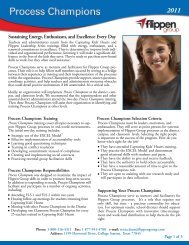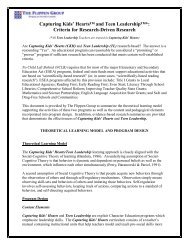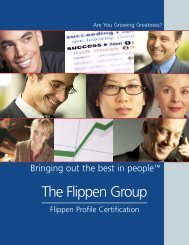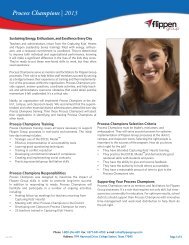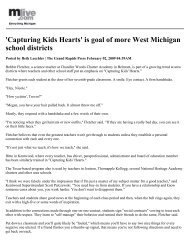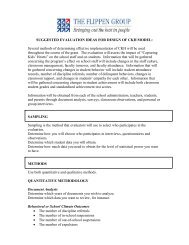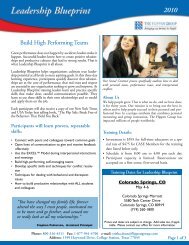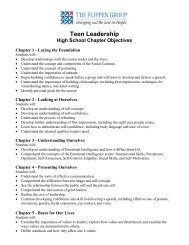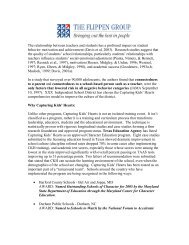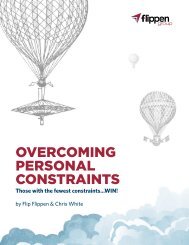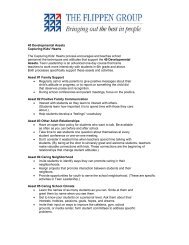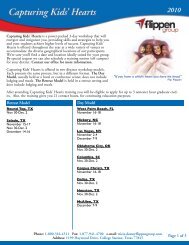Smart & Good High Schools - The Flippen Group
Smart & Good High Schools - The Flippen Group
Smart & Good High Schools - The Flippen Group
- No tags were found...
Create successful ePaper yourself
Turn your PDF publications into a flip-book with our unique Google optimized e-Paper software.
CHAPTER 5: Fostering the 8 Strengths of Character—Outcome 4Outcome 4:ETHICAL THINKERAN ETHICAL THINKER . . .◆ Possesses moral discernment—including goodjudgment, moral reasoning, and ethical wisdom◆ Has a well-formed conscience—including asense of obligation to do the right thing◆ Has a strong moral identity that is defined byone’s moral commitments◆ Possesses the moral competence, or “knowhow,”needed to translate discernment, conscience,and identity into effective moral behavior.Afew years ago, four upstate New York teens—threegirls and a boy—broke into their high school atnight, emptied several jugs of gasoline, and ignited a firethat did $500,000 in damage. All four perpetrators weredescribed as being “bright students.” In 1999, followingthe killing of 12 teens and a teacher at Columbine <strong>High</strong>School, press accounts reported that the student shooters,Eric Harris and Dylan Klebold, were both A students.<strong>Smart</strong> and good are not the same. If schools educate themind and not the morals, as <strong>The</strong>odore Roosevelt warneda century ago, they create menaces to society.<strong>Smart</strong> and good are not the same.In an echo of Roosevelt’s admonition, Yale psychologistRobert Sternberg recently observed that the U.S. educationalsystem is going rapidly and relatively smoothly—inthe wrong direction.That wrong direction is illustrated by the high-stakes systemof testing that has come to dominate the country. It is notthat high-stakes testing is, in itself, necessarily bad. It isthat what the tests measure, to a large extent, doesn’t matterall that much in the long run. What matters is not onlyhow much knowledge you have but how you use thatknowledge—whether for good ends (as Mahatma Gandhiand Martin Luther King, Jr. did) or for bad ones (asAdolph Hitler and Joseph Stalin did). 1For the past several generations, Sternberg notes, in morethan a dozen countries for which records have been available,IQs have been rising roughly at a rate of 9 pointsper generation (a 30-year period) for at least several generations.2 <strong>The</strong> increase in IQ for the elites who lead thesesocieties is likely to have been even greater. And yet, theseincreases in intelligence have not visibly improved people’sor nations’ relationships with each other. In fact,there appears to be more hate in the world than everbefore. 3 This state of affairs reflects what Harvard psychiatristRobert Coles has called the “disparity between intellectand character.” 4IQs have been rising, but humanrelations have not improved.How Should We Define and Educatefor Ethical Thinking?Because intellect and character are not the same, schoolsmust develop ethical thinking. But they must define andteach for ethical thinking in a way that maximizes theprobability that it will lead to ethical behavior. If wedefine ethical thinking too narrowly—as merely being“book smart” about ethics—then we are likely to end upusing narrow, overly intellectualized instructional strategiesthat merely teach students how to talk a good ethicalgame rather than inspiring them to want to lead an ethicallife. Here, as with the other strengths of character, weneed to begin with a good definition of the outcome inorder to design effective teaching techniques.Most of us could cite examples—including some from ourown behavior—of the difference between knowing theethical thing to do and actually doing it. Consider oneparticularly striking instance. Some years ago, the NewYork Times ran a story about an author who had his manuscript,Telling Right From Wrong, accepted by a major publishinghouse. <strong>The</strong> publisher considered it a “brilliant”treatment of everyday ethics but then halted publicationwhen it learned that the author had completely forgedseveral prestigious “endorsements” of his book.As educators, would we be satisfied if we developed in ourstudents the kind of ethical thinking exhibited by thisdeceptive author? Obviously not. A case like this shouldlead us to reflect: “This person understood ethics well<strong>The</strong> most important human endeavor isstriving for morality.—ALBERT EINSTEIN128<strong>Smart</strong> & <strong>Good</strong> <strong>High</strong> <strong>Schools</strong>



